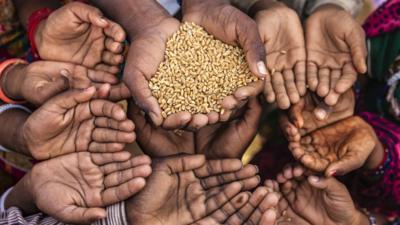Just yesterday, there was a report in the media quoting the Food and Agriculture Organisation (FAO) warning that some 25 million Nigerians are at risk of severe hunger between June and August this year.
The FAO identified the main causes of hunger to include persistent conflicts, climate change, inflation, and rising food prices. In addition, currency depreciation has also been listed as a factor to the problem.
The FAO noted that access to food has been affected by unrelenting terrorism in Borno, Adamawa and Yobe states, as well as banditry and abductions in Katsina, Sokoto, Kaduna, Benue and Niger states.
It also recalled that the National Emergency Management Agency (NEMA) reported that last year’s flooding claimed more than 676,000 hectares of farmland, diminishing harvests and increasing food insecurity across Nigeria, thereby contributing to the risk of hunger. The FAO, a UN agency, further stated that more extreme weather patterns affecting starvation are anticipated in the future.
Prioritise nutrition needs of poorest households, govt urged
Nigeria yet to tap huge mutual funds potential – Utomi
The report also highlighted the fact that children are the most vulnerable to food insecurity. It stated that approximately six million of the 17 million food insecure Nigerians today are children under the age of five, living in Borno, Adamawa, Yobe, Sokoto, Katsina and Zamfara states. There is a serious risk of mortality among children, attributed to acute malnutrition.
The FAO Resident and Humanitarian Coordinator for Nigeria, Matthias Schmale, pointed out that UNICEF (United Nations Children’s Fund), working with government and partners such as MSF and ALIMA, is investing in scaling up preventive nutrition interventions, while ensuring that vulnerable children have access to life-saving nutrition services.
What this means is that urgent and concrete measures have to be taken to at least reduce the impact.
There is an urgent need to revive and transform our agricultural and food systems to, among other things, deliver improved nutrition. All stakeholders need to redouble their efforts in order to boost food sufficiency and improve nutrition. It is not just about feeding people, it is also about providing the necessary nutrients for a healthy life.
Also, Nigeria has been grappling with security challenges, especially in the North East and Middle Belt areas of the country. This has also affected agriculture/farming in such areas, as many people are being hindered from planting or harvesting crops. If all these security challenges are properly addressed, it can help to reduce the high risk of hunger or famine.
Climate change is another factor that contributes to famine and hunger. Climate change refers to the increase in temperatures of the atmosphere over a long period of time. How does climate change affect food supply? Floods and drought brought on by climate change make it harder to produce food. Erratic rainfall patterns can also severely disrupt local food production. As a result, the price of food increases and access becomes more and more limited, putting many at higher risk of hunger.
Unless factors causing climate change are reduced by substantial reductions of greenhouse gases, it will greatly increase hunger and famine, especially in the poorest parts of the world.
It is also important to note that prevention of hunger and famine must begin in the rural areas where people coping with high levels of food insecurity live. The focus in such areas should be on growing food where it is needed the most, and keeping animals alive. This can help to stabilize and increase local food production, in order to prevent a breakout of famine.
In more isolated rural areas especially, the critical role of local and backyard food production in keeping families alive cannot be overemphasised. The importance of sustaining livestock can also not be overstated. Also, just one cup of milk a day can make the difference between life and death!
Daniel Ighakpe wrote from FESTAC Town, Lagos

 Join Daily Trust WhatsApp Community For Quick Access To News and Happenings Around You.
Join Daily Trust WhatsApp Community For Quick Access To News and Happenings Around You.